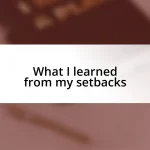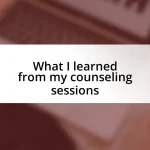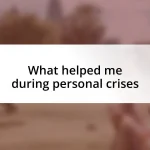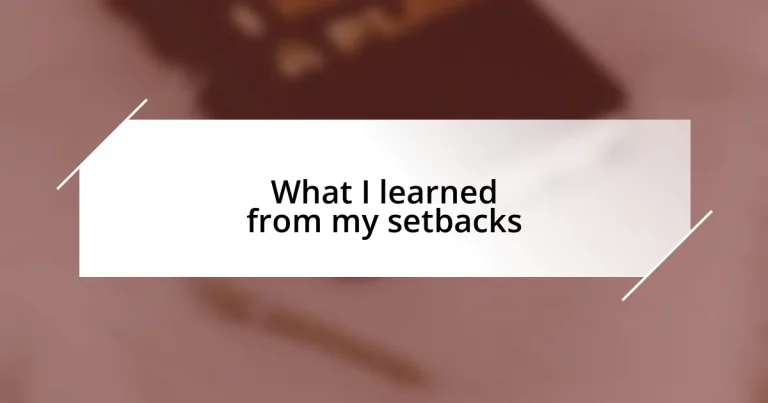Key takeaways:
- Setbacks serve as opportunities for growth, fostering self-reflection and resilience.
- Recognizing emotional responses to setbacks can enhance coping mechanisms and promote personal development.
- Setting actionable goals and breaking them into smaller tasks is essential for overcoming setbacks and building confidence.
- Building a strong support system provides valuable perspectives and emotional strength during challenging times.
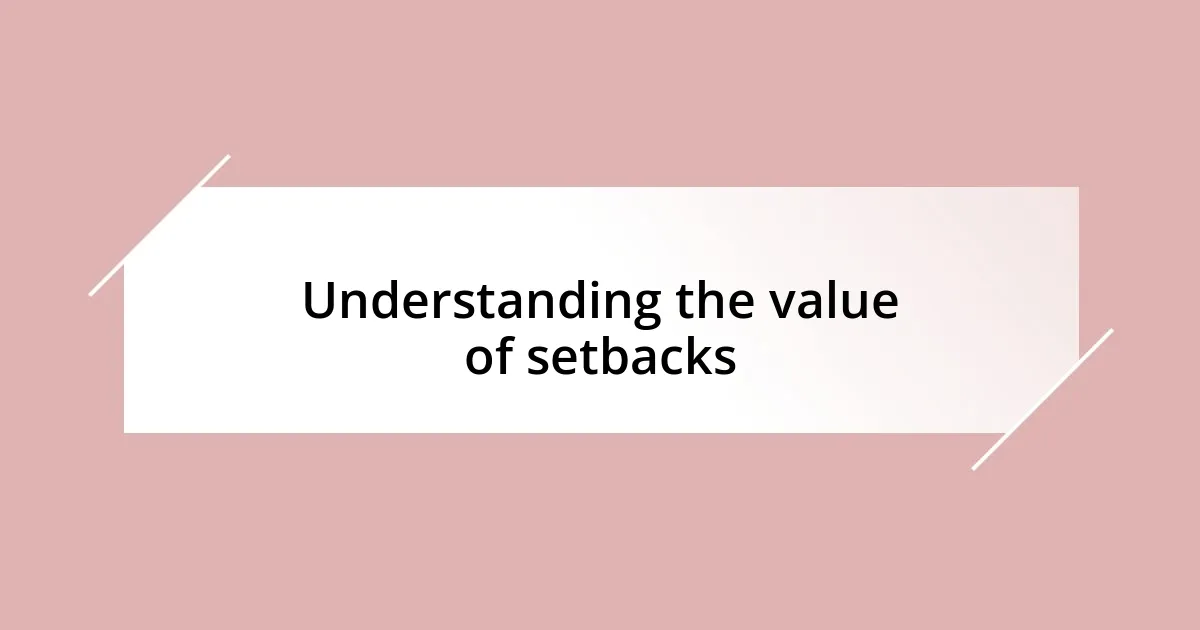
Understanding the value of setbacks
Setbacks often feel like a punch to the gut, but I’ve come to realize they serve a greater purpose. For instance, after missing out on a job I really wanted, I took a step back to analyze what went wrong. That disappointment propelled me into a period of self-reflection, revealing not only my weaknesses but also my resilience.
Reflecting on those moments, I remember a time when I failed to meet a project deadline. The stress was overwhelming, and I felt like I had let everyone down. But in the aftermath, I learned the importance of time management and communication. Have you ever felt the sting of failure only to discover a newfound strength? It’s a powerful lesson that setbacks can illuminate paths we never considered.
In essence, every setback is an opportunity for growth. When I faced rejection from a university, it led me to explore alternatives I hadn’t thought of before, like taking a gap year and traveling. That experience was transformative, teaching me about adaptability and the beauty of unexpected journeys. I invite you to reflect on your own setbacks—what wisdom did they impart?
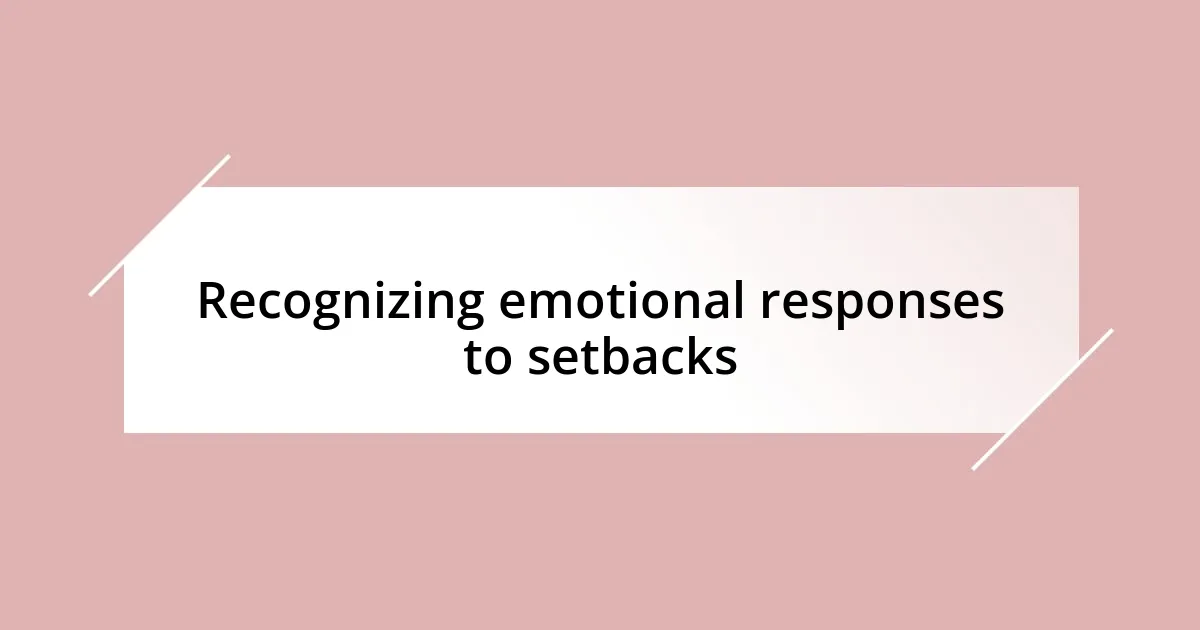
Recognizing emotional responses to setbacks
When navigating setbacks, it’s crucial to tune into our emotional responses. I remember feeling a mix of anger and sadness after receiving constructive criticism on a project I believed was my best work. Recognizing these emotions early on helped me process them, turning frustration into motivation for improvement. Understanding how setbacks affect us emotionally allows for better coping mechanisms and growth.
Here are some common emotional responses I’ve identified when dealing with setbacks:
– Disappointment: It’s natural to feel let down, especially when expectations were high.
– Frustration: This can stem from a sense of loss of control or unmet goals.
– Sadness: It often surfaces when reflecting on what could have been.
– Resilience: Surprisingly, setbacks can spark a newfound determination to succeed.
– Self-doubt: This emotion tends to creep in, making us question our abilities.
By recognizing these emotional responses, we can better understand ourselves and ultimately turn setbacks into stepping stones for future success.
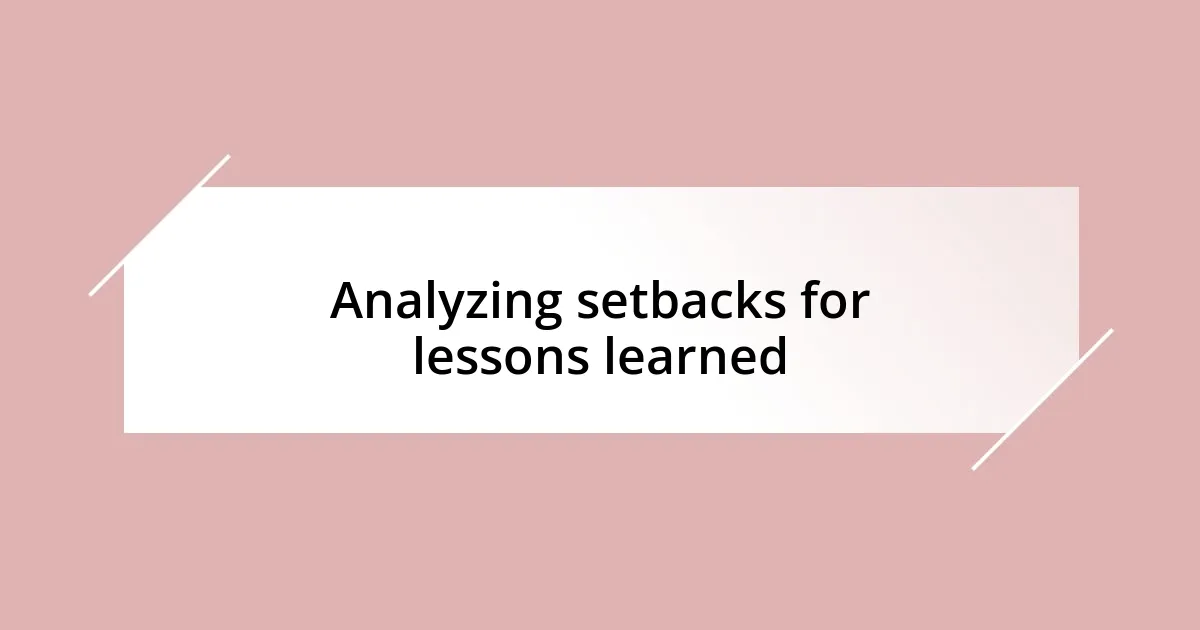
Analyzing setbacks for lessons learned
When analyzing setbacks, I’ve often found that dissecting the experience can yield valuable insights. For example, after a failed business proposal, I took a closer look at my presentation skills. I realized that I rushed through key points to save time, which left my audience confused. By pinpointing specific missteps, I could approach my next pitch with a clearer focus and a more engaging delivery.
I’ve also learned that every setback carries a unique lesson. One time, I missed a crucial client deadline due to poor prioritization. It felt disheartening, but reviewing that experience taught me the art of delegation. I began to appreciate the strength in teamwork and how sharing responsibilities can lead to better outcomes. If I hadn’t reflected on that setback, I might still be struggling alone instead of collaborating effectively.
Every setback offers a mirror reflecting not just what went wrong but also how I can improve. I once failed to secure funding for a project I was passionate about. Upon reflection, I identified gaps in my proposal and realized I had focused too much on the idea rather than its execution. This analysis not only reframed my understanding of what investors look for, but it also motivated me to refine my approach and seek feedback before my next attempt.
| Setback | Lesson Learned |
|---|---|
| Failed Business Proposal | Improved Presentation Skills |
| Missed Client Deadline | Importance of Delegation |
| Failed Funding Attempt | Need for Stronger Proposals |
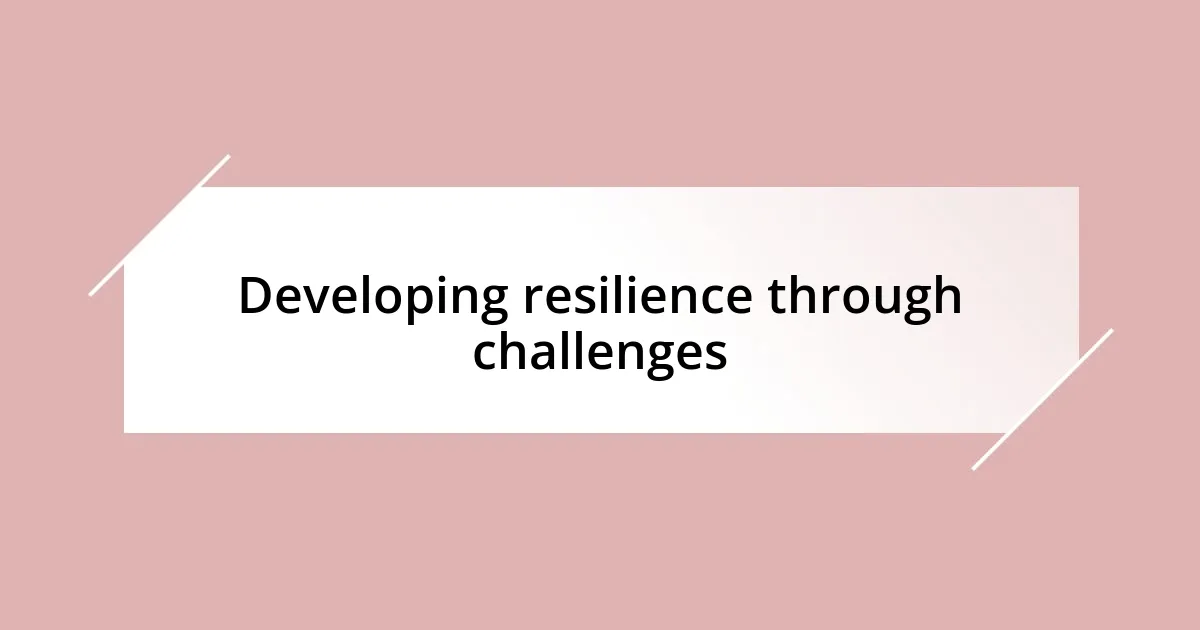
Developing resilience through challenges
Building resilience isn’t just about bouncing back; it’s about discovering what we’re truly made of. I remember a time when I faced a major setback in my career—a project I was leading fell apart due to unforeseen circumstances. At first, I felt a wave of helplessness, but as I started to piece together what went wrong, I discovered the strength I had within me to adapt and recover. This realization transformed my perspective; every challenge I faced thereafter felt like a test of my resilience rather than an obstacle.
During those tough moments, I often asked myself: What can I learn from this? One instance stands out when I was overlooked for a promotion I had my heart set on. Instead of letting bitterness take over, I sought feedback from my manager. That conversation not only illuminated areas for growth but also strengthened my relationships at work. It reinforced the idea that resilience is closely tied to our willingness to learn from criticism and to constantly refine our approach.
Ultimately, the process of facing challenges can feel daunting, but it’s essential for personal growth. I’ve learned that resilience isn’t an innate trait; it’s a skill that can be cultivated through experience. For instance, when my attempts at launching a new initiative were met with skepticism, I didn’t retreat. Instead, I gathered insights from my team, adapted the plan, and presented a revised proposal. This experience taught me that resilience is about meeting hurdles head-on and using them as a catalyst for growth, reminding me that each setback can be an opportunity in disguise.
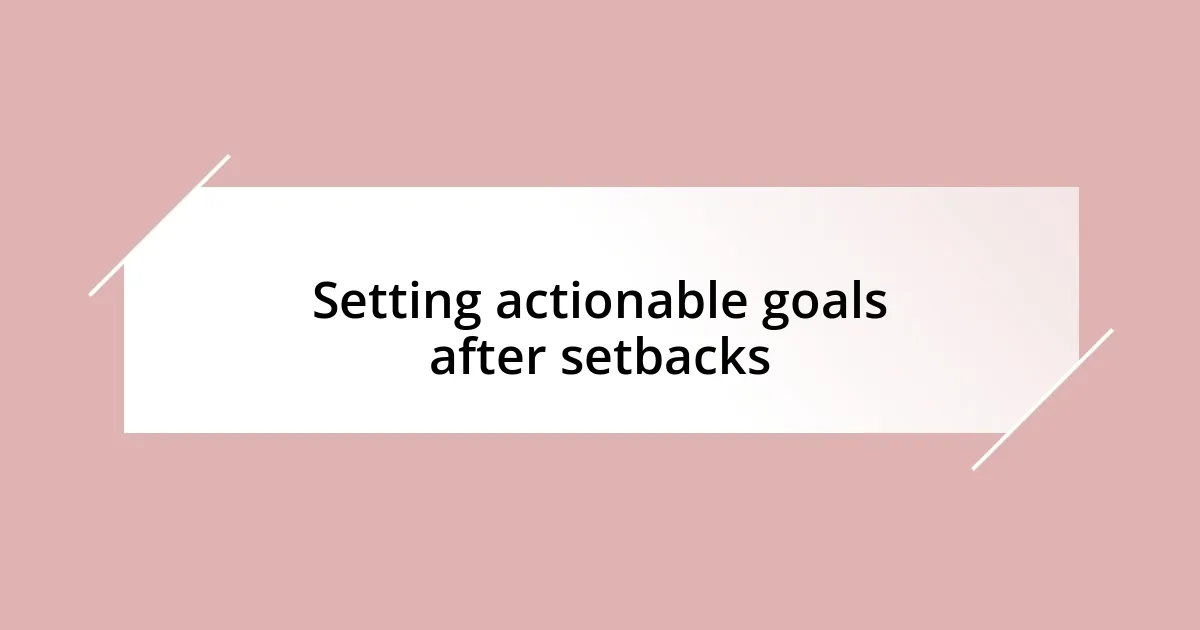
Setting actionable goals after setbacks
Setting actionable goals after setbacks is essential for growth and progress. I vividly recall a time when I missed a significant deadline for a project that I had heavily invested in. Instead of wallowing in disappointment, I sat down and set specific, actionable goals to prevent that from happening again. I focused on creating a more organized timeline and allocating time for unexpected issues. It was amazing to see how a structured plan turned my anxiety into motivation.
One of the most powerful lessons I learned involved not just setting goals, but breaking them down into smaller, achievable tasks. I remember feeling overwhelmed after a failed partnership; it felt like I was starting from scratch. To recenter myself, I mapped out a series of mini-goals that led me back to my vision. Each small win—like updating my network list or reaching out to potential collaborators—built my confidence and momentum back up. How often do we forget that big achievements come from a series of smaller actions?
Later, after facing those setbacks, I made it a habit to regularly reassess my goals. In one instance, I realized my target audience for a new project wasn’t as clear as I thought. So, I set a goal to conduct thorough market research over the following month. This not only clarified my vision but also reignited my passion for the work. It taught me that setting actionable goals isn’t just about what we aim for; it’s about how we adapt and refine our path based on previous experiences.
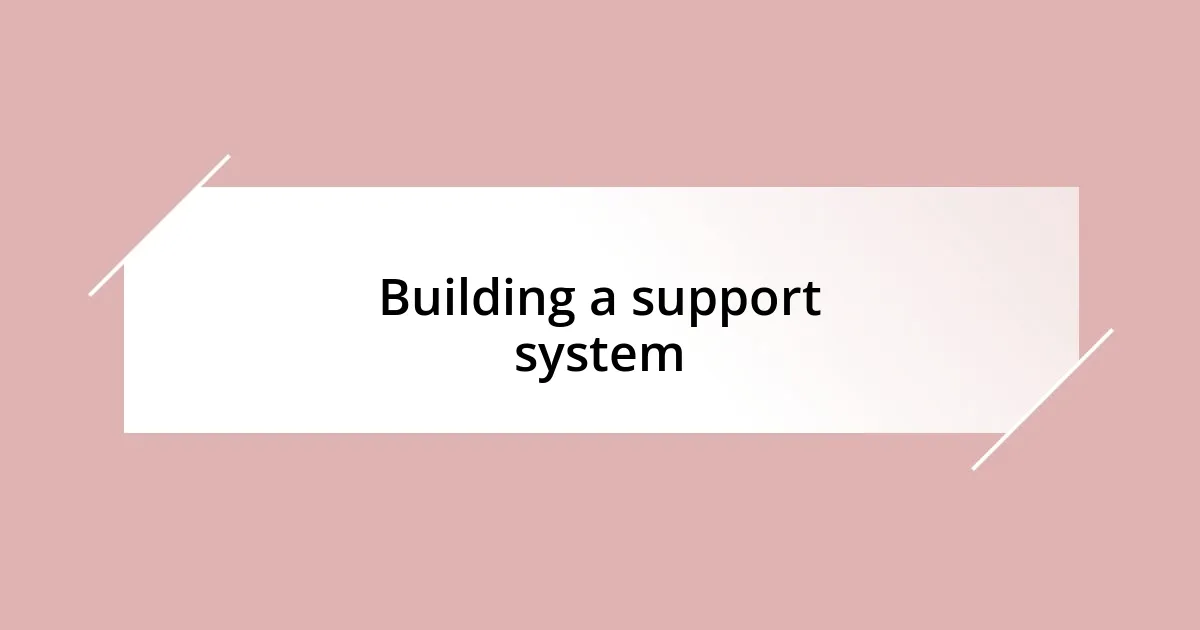
Building a support system
Building a strong support system has been invaluable in my journey through setbacks. After a particularly tough moment when my vision for a major project fell flat, I turned to my close friends and colleagues for guidance. Their input not only offered new perspectives but also reminded me that I wasn’t alone in my struggles. Have you ever reached out during a tough time and found unexpected wisdom in the people around you? I certainly have, and it reinforced my belief that surrounding ourselves with supportive individuals can turn the tide in challenging situations.
One unforgettable experience involved a mentor who helped me navigate the aftermath of a professional misstep. I remember feeling utterly discouraged, thinking I’d doomed my career over a mistake. But my mentor listened and then shared similar stories of their own setbacks, transforming my feelings of isolation into a sense of camaraderie. This interaction taught me that having someone who understands your journey can be incredibly uplifting. It’s amazing how a simple conversation can blend empathy with encouragement, right?
As I reflect on these moments, I realize that building a support system isn’t just about reaching out during crises; it’s about fostering connections that thrive over time. I now make it a point to regularly check in with my network, nurturing those relationships even when things are going well. I think about it this way: Who do you turn to when you need a boost? Creating and maintaining a supportive network not only provides practical assistance during setbacks but also builds a reservoir of emotional strength for the future.



